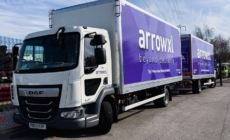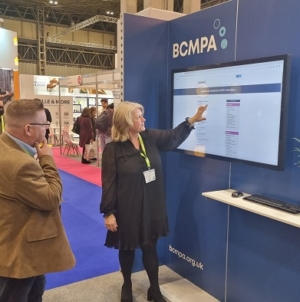-
ROSSLARE EUROPORT TARGETS HEALTH & SAFETY WITH CAMERA TELEMATICS PARTNERSHIP - 2 days ago
-
Landmark Study Reveals Wearable Robotics Significantly Boost Safety and Efficiency in Industrial Environments - July 24, 2024
-
Visku Tackle The Retail Seasonality Challenge One Pallet At A Time - July 22, 2024
-
KAMMAC AND BERGEN LOGISTICS STRENGTHEN FASHION & LIFESTYLE SERVICES IN THE UK - July 19, 2024
-
TENTBOX EXTENDS PARTNERSHIP WITH ARROWXL TO SUPPORT INCREASING DEMAND - July 17, 2024
-
The Perfume Shop improves customer journeys while driving profitability in partnership with Scurri - July 17, 2024
-
ZEROMISSION SECURES £2.3M ($3M) INVESTMENT TO ACCELERATE ELECTRIC FLEETS - July 16, 2024
-
BCMPA CELEBRATES SUCCESS OF 2024 CONFERENCE - July 15, 2024
-
Best of the Best: Jungheinrich Celebrates Triple International Award Win - July 12, 2024
-
GOPLASTICPALLETS.COM CALLS ON NEW CHANCELLOR RACHEL REEVES TO CONSIDER PLASTIC PACKAGING TAX REFORM - July 10, 2024
Is Amazon Killing our Retail Economy?
Comment by: Phoebe Griffits
The recent announcement from Marks & Spencer regarding multiple store closures is next in the long chain of major UK retailers shutting their doors. Other announcements in 2018 include Toys R Us, Maplin, Gap, Michael Kors and Abercrombie and Fitch.
M&S’ annual pre-tax profits fell by nearly two thirds in the last 12 months, with major losses on food, clothing and homeware sales.
Why Is This Happening?
The UK retail sector is being hit harder than ever by the online market. In particular, the e-commerce giant, Amazon.
If you think of buying children’s toys, gadgets, books or electrical goods, what’s the first place you think of? Probably Amazon – not the high street shops that specialise in providing these products.
This is because Amazon offer an easy online ordering process, super-fast delivery, lots of choice and prices that are usually cheaper than anywhere else. This is great for your Christmas shopping, but not so great for the UK economy when we are ploughing our money into a company that sends most of its profits abroad.
M&S have already spent ‘vast sums’ of money on a new website and fulfilment centre in competition with the ever-expanding e-commerce market. However, there have already been complaints that the website is too slow and they are struggling to cope with demand.
How Is Amazon Doing it?
Amazon are forever expanding their range of products and services, making themselves a huge competitor for a majority of UK retailers.
If they want to introduce a new product, they already have the website, the warehouses, the delivery services and the advertising to do so. Therefore it is near enough impossible for other businesses who want to provide similar services to compete with, Amazon can do it so much quicker and so much cheaper.
11 Years of No UK Tax Payments…
In 2015, Amazon became the first technology company to abandon the structure that allowed them to divert their sales and profits away from the UK. This means that they are now booking their sales through the UK, meaning their profits are taxed by HMRC and going back into the UK economy.
However, Amazon spent the previous 11 years recording their UK sales in Luxembourg, the location of their European headquarters. This meant that the UK hardly saw any return on the billions upon billions of pounds that was spent on the website in the UK during that time.
Although Amazon are now paying their taxes to the UK, it’s still not as much as other UK based businesses.
According to a report from the Centre for Economics and Business Research, independent bookshops in the UK pay 11 times the corporation tax that Amazon does. The report showed that independent bookshops pay 91p per £100 of turnover and Amazon only pays 8p.
What Does the Future Look Like?
Online retailers are creating a whole new culture for the way we shop. It’s convenient, it’s quick and it’s cheap.
In the same report from the CEBR, they revealed that bookshops are currently closing at a rate of 3% per year with 867 independent booksellers currently in the UK– almost half the number there was 11 years ago. They say themselves that retailers are “facing an increasingly challenging trading environment” naming Amazon’s market power and other advantages.
It’s sad to think that taking your children to a toy shop could be a thing of the past. And, a lot of teenagers’ first jobs are in retail, giving them a chance to meet people and work with customers. If things continue the way they are, first jobs will end up as warehouse workers, packing boxes.
Where Are We To Blame?
I personally know of a lot of people who go into a store, have a look at the products, try them out and then go online to buy them cheaper. But, if everyone is doing the same, we will eventually lose that luxury of being able to go into the shop and try products because, if they are not making the money, they will close down.
By saving a few pounds now, we could be damaging the economy for the future. We need to choose carefully where we spend our money and think more of what will be returned to us by doing so.
Inside Amazon’s Warehouses
Unfortunately, discovering how Amazon operates as a company wasn’t too positive.
An investigation conducted by The Mirror last year revealed the harsh reality of what it’s like working in one of Amazon’s huge warehouses (I’m not exaggerating, the Tilbury, Essex warehouse is the size of 11 football pitches!).
With staff sometimes forced to work 55 hour weeks to reach impossible targets, some are falling asleep whilst standing and others are even receiving medical treatment due to stress and exhaustion.
Alan Selby, reporter who worked in one of the warehouses undercover for 5 weeks, claimed he walked on average 10 miles a day, and the only time he was able to rest was during his two half an hour breaks on a 10 and a half hour shift from 7:30am – 6:00pm. Even toilet breaks are timed!
However, Jeff Bezos, founder of Amazon, has stated that this information is untrue and does not reflect the Amazon that he knows. He also said that he “would leave such a company” himself if this information was to be true.
So, considering the likelihood of Amazon becoming one of the biggest companies and biggest employers in the world, we would very much hope that this information is not true of their general work practices.
https://www.kisbridgingloans.co.uk/

































